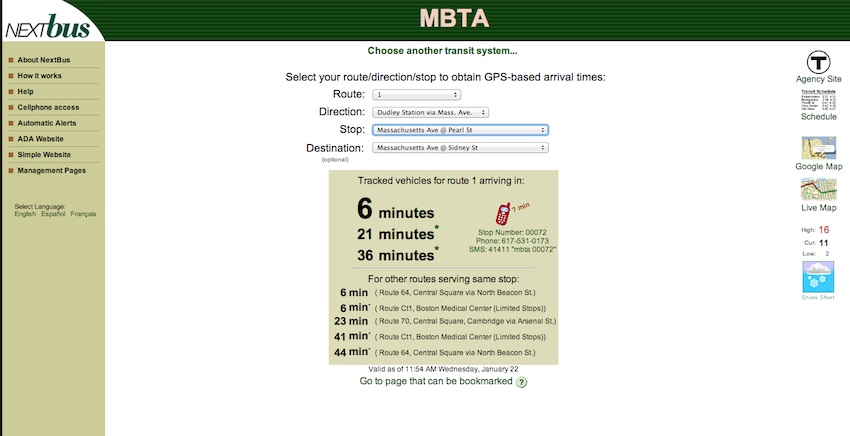Here’s to You, MBTA Bus-Tracking Apps

A NextBus.com screenshot shows the wait times for a #1 Bus from Central Square.
Let’s take a moment to appreciate how the modern world makes your morning commute somewhat less awful.
It might seem like a strange occasion for such musings. It snowed a whole bunch in Boston, and that means the #1 Buses usually don’t come for 30 minutes, and when they do, they come in packs of three, all of them full of slush-covered zombies who can’t or won’t make room for you to board.
But by now, you maybe have an app that uses tracking data to tell you how long you’ll have to wait for the next bus to come. The MBTA partners with NextBus, providing them real-time GPS locations for their buses, which the app then calculates into an arrival time prediction. The innovation is years old, but let’s just all nod our heads and agree that this app is the greatest thing to hit mornings since the snooze button. In appreciation, The Atlantic Cities today highlighted research that shows just how important these apps have become to the commuters who use them. Kari Watkins, an assistant professor at Georgia Tech, studied people who used a similar app in Seattle. Research showed that people who knew exactly where the bus was were less likely to overestimate how long it ended up taking. Plus, as The Atlantic‘s Emily Badger writes:
In their earliest research on the impact of such mobile tools, Watkins and Ferris identified two other implications that have grown increasingly relevant as apps like this have become more ubiquitous: Riders who used OneBusAway not only perceived that their waits were shorter, they actually waited for less time, too, because the app enabled them to plan their travel better. Why head out for the bus right now, if you know it won’t come for another seven minutes?
What’s more: In surveys of these early OneBusAway users, 92 percent of them reported that they were more satisfied with public transit as a result of using the app.
Anyone who uses this app, especially on days like these when the system is operating erratically, doesn’t need to be told this. Particularly apt is the observation that wait times go down when you can look at your phone while you’re getting ready in the morning or sitting at your desk in the evening, timing your departure for the bus stop accordingly. The thrill-seekers among us know how to game it so they don’t have to wait at all, dashing out just in time to walk straight onto a bus with its doors wide open.
The alternative—standing outside in a snow bank wondering if the buses are running on schedule (they aren’t) or if you arrived two minutes after the last one left (you did)—is a pretty unbearable thought in this brave new world of technologically optimized commute times. The bus goes from being a sad, miserable option to one that’s often smoother than the Red Line. As Badger notes, this app gave transit agencies like the MBTA a really simple way to improve customer satisfaction without improving bus frequencies or even schedule accuracy.
That said, it’s still a smartphone app, which means its not exactly the most populist of transit tools. Buses, in particular, aren’t just for the Droid-wielding commute-hackers among us who want an extra five minutes built into our day. Luckily, these apps have browser versions, so at least you can check your wait time from a computer before you head out the door in the morning. In a dream world where the MBTA had unlimited money, perhaps they would install wait clocks like the ones they’ve rolled out on T platforms at major bus stops. (Just, first, do something about that Green Line, hypothetically well-funded MBTA.)
Despite this technological dream’s limitations, it’s psychologically worthwhile on days when you probably had an extremely annoying commute to appreciate how technology has made it slightly better than it would be otherwise. This writer once showed the app to a friend who had been attending grad school in Boston for years without anyone informing her of its existence. A week later, she texted to say that the app had “changed my life.” So here’s to you, bus-tracking app. You make living in blizzard country slightly more bearable.


